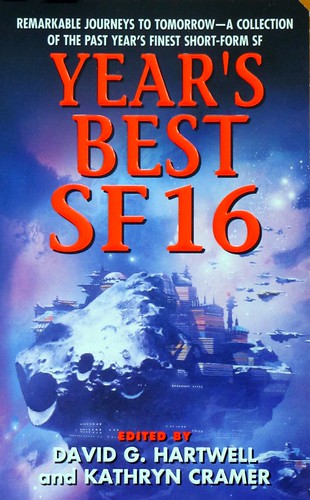Well, Blagofest was not a success. I didn’t even participate in the follow-up Blogtember, either (and the less said about the rest of Spring, the better). But that ends now: Decemblog begins today!
In the interests of getting stuff done more often, I’m not going to just do fiction this month – I’m also going to venture into the realm of amateur criticism! I recently picked up a copy of Year’s Best SF 16, and if nothing else have really enjoyed the fact that I am once again reading fiction – it’s strange how quickly you can fall out of the habit.

Let's put that title to the test.
The Year’s Best SF series has been full of ups and downs for me in the past, but this year’s edition was pretty good. Not as many surprises as I’ve had from previous ones, but a lot of good fiction nevertheless.
So, short reviews of short fiction. I’ll be doing the stories in the order they’re printed in the anthology, and to add a little variety to the process I’ll be focusing on three elements picked randomly for me by a program I wrote (it’s surprisingly difficult to write an efficient RNG that keeps track of options you’ve rolled in the past). Since I’d rather provide a self-contained review than a partial one, I won’t make any effort to avoid spoilers – those who would really care ought to know better than to read the review before the story. Today’s review is of Joe Haldeman’s Sleeping Dogs.
RNG results: Concept, Clever Tricks, Nitpicks
I’d never read anything written by Haldeman before this story, although I’d heard his name thrown around here and there on a few SF boards. New territory, it seems!
The setting is fairly straightforward – an FTL-enabled future with evil corporate overlords bent on exploiting the colonies (not that that makes any sense in a setting with the kind of technology you’d need to travel between the stars, but that’s how the subgenre works, I suppose). The central plot device of ‘aqualethe’, a memory-erasing drug that the protagonist is trying to shrug off, is unremarkable, but his profession is a rather neat idea: he works as a ‘thanatopic counsellor’, talking to post-mortals who are tired of life and helping them to plan their deaths and their legacies. Not much was done with the idea, but it worked well as a hook anyway.
Perhaps the most curious part of the story is the fact that we learn almost nothing about the protagonist beyond his profession, gender, and age – he is never named, and there’s no real feel of personality from him in his narration or dialogue. It’s possible that this was a deliberate choice by the author, made to reinforce the issue of memory loss the story deals with, but it strikes me more as lazy characterisation.
My only other gripe with the story is the one I started off with: the setting is really quite silly. For all of the technological difference from the present day and age, society seems to have changed very little; apparently having the scientific and technological know-how to facilitate affordable interstellar travel doesn’t allow for the possibility of a post-scarcity economy or, I dunno, anything that deviates from the Peter F. Hamilton norm of “private industry owns everything, hope you like working your way up the corporate ladder”. So disappointing.
I realise that this has been a pretty negative assessment of the story, which now that I think about it isn’t quite fair; it’s told fluidly and with a great sense of place and time – lots of attention is paid to incidental details that flesh out the feeling of the protagonist being on a journey and living day-to-day. If nothing else, it was an enjoyable read, but it didn’t really leave me with anything to think about. It’s kind of like a reverse Philip K. Dick situation – the execution is solid and workmanlike, but the ideas are dull and uninspired.
Three and a half stars.
- reviews to date: 1
- average score: 3.5
That’s it for now – tomorrow I’ll be looking at Kay Kenyon’s Castoff World, hopefully in a little more detail.

I hope you rate them all three and a half stars.
Three and a half stars?
What are you, the Advertiser Review?
Pingback: Review: Castoff World | Telling Stories